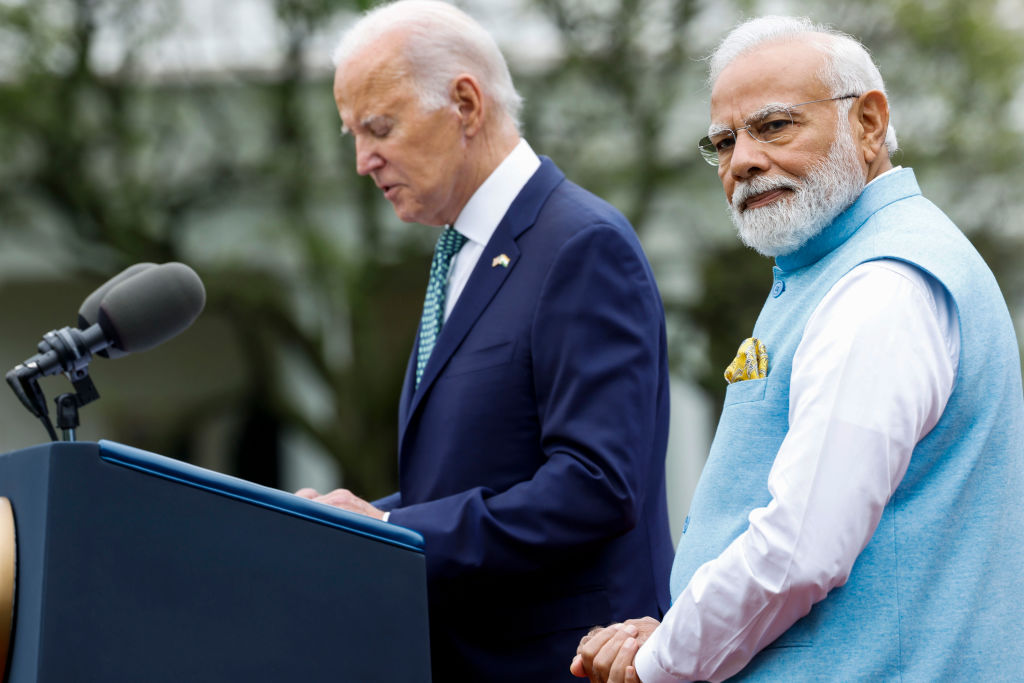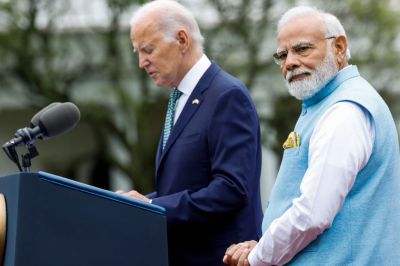Happy Friday! In case you need any more evidence that tech billionaires are the weirdest people on the planet, Elon Musk and Mark Zuckerberg have apparently challenged one another to a cage match. No matter who wins, America loses.
Quick Hits: Today’s Top Stories
- Indian Prime Minister Narendra Modi addressed a joint session of Congress yesterday during his first state visit to the United States, applauding the “bond between the world’s two great democracies” and calling U.S.-India relations “a defining partnership of this century”—echoing comments made by President Joe Biden at a joint press conference earlier in the day. Several progressive lawmakers boycotted the speech, citing repressive actions taken by Modi’s government to target religious minorities and political opponents.
- Ukrainian forces on Thursday struck a key bridge connecting Crimea and southern Ukraine, damaging one of the few links between the occupied peninsula and the front line. The attack is part of the Ukrainian military’s strategy of degrading Russian supply lines as the counteroffensive has slowed in recent days.
- The House Ways and Means Committee on Thursday released redacted transcripts of testimony from two IRS employees who claimed the Justice Department and Delaware U.S. Attorney’s office interfered with the agency’s investigation into Hunter Biden’s taxes by delaying its conclusion, blocking enforcement actions, and coordinating with Hunter’s attorneys. The allegations—which a DOJ spokesperson claimed were untrue—were publicized just days after Hunter agreed to plead guilty to two misdemeanor tax counts and agreed to enter a pretrial diversion agreement to resolve an illegal firearm possession charge.
- Federal Reserve Chair Jerome Powell told the Senate Banking Committee on Thursday the central bank will likely need to resume its interest rate hiking campaign in the coming months to return inflation to the Fed’s 2 percent target rate. Powell’s comments come one day after he addressed the House Financial Services Committee, cautioning that the Fed’s decision last week not to raise rates for the first time in months does not mean rates won’t continue to climb later this year.
- A Russian court on Thursday rejected an appeal from Evan Gershkovich, the Wall Street Journal reporter who was arrested in March on unsubstantiated allegations of espionage. The appeal sought to overturn a May court ruling that extended his pretrial detention until at least August 30. The editors of more than three dozen top global news outlets and President Biden have called for Gershkovich’s release.
- All five passengers aboard the Titan submersible that went missing Sunday while touring the wreckage of the Titanic are presumed dead, the U.S. Coast Guard said Thursday afternoon. The revelation—which came after the Coast Guard found a debris field near the Titanic that was later assessed to be from the missing vessel—concluded an extensive four-day search that involved American, Canadian, and French ships and aircraft and covered more than 10,000 square miles.
- Former GOP Rep. Will Hurd announced Thursday he’s running for president, arguing the Republican Party must reject Donald Trump and embrace “common-sense leadership.” The former CIA intelligence officer enters the race as a self-described “dark horse candidate” with little name recognition in an already crowded GOP field. To qualify for the first primary debate in August, he will need to earn at least 1 percent support nationally in multiple polls and have at least 40,000 unique donors.
- Democratic Rep. Lisa Blunt Rochester of Delaware announced Wednesday she is running for the U.S. Senate, looking to succeed the retiring Democratic Sen. Tom Carper—who has endorsed her bid.
Mad about Modi

Yoga outside the United Nations, a chat with Elon Musk, a speech before Congress, and a rare state dinner at the White House, complete with a vegetarian menu: Indian Prime Minister Narendra Modi’s state visit to the United States this week demonstrated just how far he’s come since being denied a U.S. visa in 2005 over his alleged role in the deaths of nearly 1,000 Muslims during the 2002 Gujarat riots.
He’s got China to thank.
That’s not the whole story, of course—the United States has plenty of other reasons to pursue strong ties with Modi. India became the world’s most populous country this year and is increasingly attractive to foreign investment and influential in South Asia. And Modi is that country’s democratically elected, enormously popular leader—boasting an approval rating near 80 percent—who is likely to win reelection next year.
But China is a big part of the story. For the United States, India is a crucial counterweight to China’s heft in the Indo-Pacific. For India, 2020 border clashes with China—and China’s too-cozy relationship with Pakistan—drove home the rising threat its neighbor poses. “What you have now is an acute awareness in India that it needs to do something about China,” says Manjari Chatterjee Miller, a senior fellow for India, Pakistan, and South Asia at the Council on Foreign Relations. And similarly, “if we see China as our number one threat in the next decade or two decades, then we absolutely need India, we cannot afford to alienate India.”
Modi confirmed this priority during his address to Congress Thursday afternoon. “The dark clouds of coercion and confrontation are casting their shadow in the Indo-Pacific,” he said. “The stability of the region has become one of the central concerns of our partnership. We share a vision of a free, open, and inclusive Indo-Pacific.”
A string of initiatives rolled out around Modi’s visit illustrated this blend of economic and military priorities. U.S. company Micron announced a more than $800 million investment in a semiconductor assembly and test facility in India, the U.S. and India both confirmed they’ll open new consulates in each other’s nations, and India committed to buying General Atomics drones. Perhaps most significantly, the Biden administration announced an agreement—subject to congressional approval—to let General Electric co-produce fighter jet engines in India, a rare level of military technology sharing for a non-ally country. In addition to strengthening India’s ability to deter Chinese aggression, this step could help its ongoing efforts to wean off Russian arms—India currently buys about half of its military supplies from Russia.
Congress joined the fun. Sens. Mark Warner and John Cornyn, a Democrat and Republican respectively, introduced a bill Thursday which would streamline arms sales to India. “We need to continue to encourage India to align itself with the democracies in the world and not the autocracies,” Cornyn said, highlighting the value of giving India an alternative to Russia for weapons sales. Dependence on Russian weapons has likely contributed to India’s reluctance to condemn the invasion of Ukraine.
But Modi’s visit drew plenty of criticism—less for the specific initiatives announced than for the Biden administration’s reluctance to confront the Indian leader on human rights issues. A member of the right-wing pro-Hindu Bharatiya Janata Party, Modi became prime minister in 2014 after leading western India’s Gujarat state for more than a decade. Under Modi’s leadership, India’s government has arrested opposition leaders, eroded the judiciary’s independence, threatened journalists, blocked activists from leaving the country, and increased the central government’s control over states with large Muslim populations. More than 70 Democratic lawmakers urged Biden to “raise directly with Prime Minister Modi areas of concern,” and a handful of House Democrats boycotted Modi’s speech.
Yet the Biden administration has continued to tout not only India’s place among the world’s oldest and largest democracies but Modi’s leadership in particular. “He is the most popular world leader for a reason,” Commerce Secretary Gina Raimondo said of Modi in April. “He is unbelievable, visionary, and his level of commitment to the people of India is just indescribable and deep and passionate and real.” President Biden didn’t go that far during Modi’s visit but reiterated the United States’ “overwhelming respect” for India as a fellow democracy.
At a joint press conference with Biden—Modi’s first press conference since taking office nearly a decade ago—the Indian prime minister declared his support for democratic values but didn’t directly answer a reporter’s question about what he would do to secure the rights of Muslims and other minorities in India. “There’s absolutely no space for discrimination,” he said, per a translation. “If there are no human values and there is no humanity, there are no human rights, then it’s not a democracy.”
Not that Biden should’ve treated Modi to a tongue-lashing, Miller argues. “It’s not simply a matter of alienating Mr. Modi, it would alienate vast swathes of Indians as well,” she tells TMD. “Calling Mr. Modi out for an erosion of values—I don’t think would have the effect of strengthening Indian democracy.”
But a clear-eyed assessment of concerning trends in India could keep the U.S. from counting on the country to join values-based initiatives—such as robustly condemning Russia’s invasion—and prevent nasty surprises if further engagement doesn’t reverse undemocratic trends, as it didn’t in China. “The concern is that perhaps India, if it continues on its current path, will diverge further in terms of what it wants to do in the world, what it wants to do with its greater power, what it would do with an improved U.S. partnership,” says Daniel Markey, a former Pakistan and India-focused official on the State Department’s Policy Planning Staff. “My main concern is just that we are possibly kidding ourselves or misrepresenting a trajectory that we’re on.”
Hurd Is Running
It’s possible former Rep. Will Hurd of Texas has been playing the long game. “You don’t win hearts and minds 90 days before an election,” he told TMD’s Declan Garvey in early 2020. “You win hearts and minds two years before the election, right? That’s how you establish trust, and it’s over time.”
Today—just more than three years since that interview and just more than two since he left Congress—he’s probably hoping he was right. On Thursday, Hurd announced he is seeking the GOP nomination for president, joining the dozen-or-so candidates in a crowded Republican field. The devoted moderate is trying to stake out an anti-Trump, “common sense” lane, but with a high bar to get on the debate stage and a relatively low national profile, he’ll have an uphill battle ahead of the first primary contests early next year.
In his announcement on CBS Mornings Thursday, Hurd acknowledged he was a “dark horse” candidate. “Is the path narrow?” he said. “Absolutely. But it’s something that we have to do, because it’s too important—what we have to accomplish is too important.”
Outside Texas and D.C., Hurd is by no means a household name. First elected to the House in 2014, he served three terms representing Texas’s 23rd Congressional Sistrict—a swing district that stretches across the majority of the Texas-Mexico border—before opting not to run for reelection in 2020. “There are very few members of Congress who have been able to parlay that base into the national profile you need to really successfully compete in primaries and get delegates,” longtime GOP political consultant Mike Murphy tells TMD.
Hurd is poised to try, though, and he signaled Thursday he’d be making immigration policy and border security a key part of his campaign. Hurd was a vocal critic of Trump’s border policy during his congressional tenure, condemning the Trump administration’s move to separate parents and children who had crossed the southern border illegally and criticizing the former president’s border wall as a “third-century solution to a 21st-century problem.” Instead, Hurd has pushed for the adoption of new technologies—like a fiber optic cable buried under the border to track movement across it—to solve the problem at the border. He’s also a proponent of expanding legal pathways to immigration.
While running for office requires people to know your face, Hurd’s first career had a different set of incentives. For nearly a decade in the early 2000s, he worked as an undercover CIA officer serving in the Middle East—and his experience collecting intelligence gives his critique of Trump’s alleged mishandling of classified materials a particular bite. “Here’s why this is frustrating to me,” he said on CBS News. “Donald Trump knew the kinds of information that he had. When you look at the classifications of these documents—these are information that, if it got into the wrong hands, would lead to a loss of life.”
“It spits in the face of the thousands of men and women who every single day and every single night put themselves in harm’s way in order to keep us safe,” he continued. “To me, that’s unacceptable.”
Hurd—like former New Jersey Gov. Chris Christie—is hoping his willingness to go after the GOP frontrunner separates him from the pack. “You can’t be afraid of Donald Trump,” Hurd said yesterday. “Too many of these candidates in this race are afraid of Donald Trump.” In his announcement video, Hurd called Trump a “lawless, selfish, failed politician.”
Unlike Christie, however, Hurd has never been a passenger on the Trump Train. After the Access Hollywood tape was released in October 2016, Hurd called on his party’s nominee to drop out of the presidential race. He didn’t vote to impeach Trump in 2019—he concluded Trump had made “bungling foreign policy decisions” with Ukraine that didn’t rise to the level of bribery or extortion—but he probably would have the second time around. Though a private citizen by January 6th, 2021, Hurd said at the time the insurrection “should be treated as a coup led by a president that will not be peacefully removed from power.”
Running for president takes money, and the Federal Election Commission campaign finance reports—the next round of which will be released in July—will give some indication of how Hurd is fairing on the fundraising front. But in order to get on the GOP debate stage in Milwaukee on August 23, the Republican National Committee has mandated candidates prove that money has come from 40,000 unique donors spread across the country, a threshold Hurd may not meet. But, “there will be other debates,” Murphy tells TMD. “And there might be other formats. If Christie and Hurd and [North Dakota Gov. Doug] Burgum don’t make it, they should chip in a joint million bucks, buy an hour, and call Trump a coward for not showing up and do their own little TV show there. There are a whole lot of things they can do in the preseason to get attention.”
In the more than two years since his last day on the Hill, Hurd has been trying to “win hearts and minds.” One of a handful of black Republicans for much of his congressional tenure, he’s repeatedly argued his party needs to expand its appeal, building a party that “looks like America.”
Worth Your Time
- In a piece for the Washington Post, Sydney Page profiles the striking life of the lobster lady. “For the past 95 years, Virginia Oliver’s morning routine has been much the same: She applies red lipstick, puts on her fishing gear and—just before daybreak—she boards a boat,” Page writes. “Then, for several hours straight, she hauls lobster traps.” The native of Rockland, Maine, has been lobstering since she was 8 and turned 103 earlier this month. “Oliver enjoys the freedom of navigating her family’s 30-foot boat—which her late husband named ‘Virginia,’ after her,” Page explains. “Oliver recently renewed her commercial license and is planning to start her 95th season hauling lobsters in a few weeks. She is excited to soon be ‘getting out on the water,’ she said, ‘and doing what I’ve always done.’”
Presented Without Comment
Politico: DeSantis Won’t Say if He’ll Support Trump in 2024
Also Presented Without Comment
Washington Post: Kari Lake Accused of Defamation in Suit Filed by Arizona Election Official
Toeing the Company Line
- In the newsletters: Nick questions (🔒) why Will Hurd is running for president and Scott explains (🔒) America’s legal immigration problem.
- On the podcasts: Steve, Jonah, and Sarah take to The Dispatch Podcast to discuss Hunter Biden’s plea deal, Trump’s Fox News interview, Will Hurd and Robert F. Kennedy’s presidential bids, and the tragic Titanic submersible story.
- On the site today: Grayson has the latest on the legal challenges facing the PGA Tour/LIV merger, Sinan Ciddi looks at Turkey’s anti-Western turn under President Recep Tayyip Erdoğan, and Kristen Soltis Anderson and Lauren Leader dig into Republican women’s complex views on abortion,.
Let Us Know
Are you familiar with Will Hurd? Would it be good for the GOP to have him on the debate stage in August?
*Correction, June 23, 2003: An item in the Quick Hits section incorrectly claimed that Hunter Biden pleaded guilty to two misdemeanors. The deal must still be approved by a federal judge.








Please note that we at The Dispatch hold ourselves, our work, and our commenters to a higher standard than other places on the internet. We welcome comments that foster genuine debate or discussion—including comments critical of us or our work—but responses that include ad hominem attacks on fellow Dispatch members or are intended to stoke fear and anger may be moderated.
With your membership, you only have the ability to comment on The Morning Dispatch articles. Consider upgrading to join the conversation everywhere.